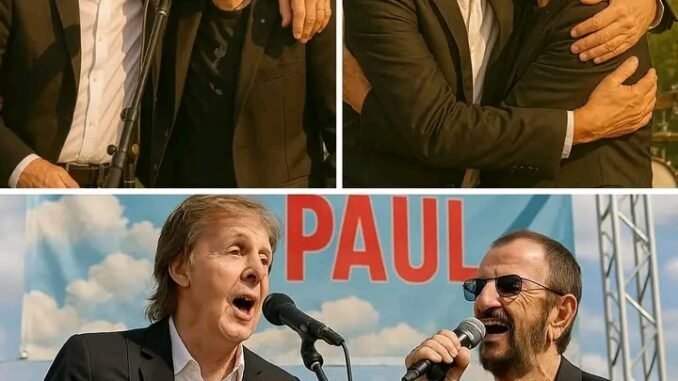
Absolutely! Here’s a 900-word article expanding on your electrifying concert recap, turning it into a rich, immersive narrative:
A Night for the Ages: Paul McCartney, Ringo Starr, and Joe Walsh Ignite an Unforgettable Beatles Reunion Under the LA Sky
On a warm summer night in Los Angeles, history didn’t just knock—it kicked the door down and sent 58,000 fans into a euphoric frenzy. Music lovers gathered at the sold-out SoFi Stadium expecting a night of timeless Paul McCartney hits. What they got was something far more profound: a surprise Beatles reunion and a rock ‘n’ roll showdown that turned into one of the most unforgettable nights in live music history.
Sir Paul McCartney, still striding across stages with the energy of a man half his age, had already delivered a breathtaking set filled with classics like “Let It Be,” “Hey Jude,” and “Band on the Run.” Backed by his crack touring band, he rolled through decades of music with casual brilliance, his voice warm and clear, his Hofner bass still iconic under the stage lights.
But just when the crowd thought they’d seen it all, McCartney stepped to the mic with a twinkle in his eye.
“I’ve got a little surprise for you,” he said, the massive screens around the stadium flickering as the lights dimmed.
The audience held their breath.
Then came the unmistakable beat of “Sgt. Pepper’s Lonely Hearts Club Band (Reprise),” and out walked none other than Ringo Starr, grinning beneath his trademark shades. The stadium erupted. Fans screamed, cried, hugged strangers, and raised their phones to capture the moment they’d tell their grandkids about.
It was real. Ringo—just days after celebrating his 79th birthday—looked fired up and ready to take the stage like it was 1969 all over again. Sliding behind the drum kit, he powered through the track with explosive energy, locked in with McCartney in a way that only bandmates of that caliber and history could be.
And they weren’t done.
Ringo launched into the blistering “Helter Skelter,” his drumming furious and precise. McCartney matched him in ferocity, delivering the gritty vocals like a man possessed. The performance was raw, chaotic, and beautiful—a live wire of nostalgia and raw rock power that sent the crowd into overdrive.
But McCartney had one more trick up his sleeve.
As the lights flared and the band eased into the haunting harmonies of “The End,” a new figure stepped into the spotlight: Joe Walsh, the Eagles’ guitar god and longtime brother-in-law to Starr.
Walsh, armed with his signature slide guitar and that Cheshire-cat grin, tore into the triple guitar solo with a vengeance. Trading licks with McCartney’s band and dueling under strobes and fireworks, Walsh brought a whole new dimension to the song. The chemistry between him, Paul, and Ringo was electric, like old friends finishing each other’s musical sentences in real time.
The crowd was on its feet, roaring with every bend and riff, swept up in a moment that felt suspended outside of time. Celebrities dotted throughout the stadium—Leonardo DiCaprio in a cap and sunglasses, Emma Stone dancing with abandon, and even Harry Styles nodding along from the VIP pit—seemed as starstruck as the rest of the crowd.
The trio finished “The End” with the famous couplet—“And in the end, the love you take is equal to the love you make”—and the moment crystallized into something sacred. No pyrotechnic could match the quiet power of that lyric delivered by two living Beatles and a guitar legend, united in sound and soul.
What followed was a three-hour rock extravaganza, but even McCartney seemed aware that the night had transcended the usual concert format. There was joy in the air, a kind of collective high, as generations danced, sang, and shed tears in unison. It was more than music. It was memory, myth, and magic colliding in real-time.
There were tributes to John Lennon and George Harrison. McCartney performed “Here Today,” his acoustic love letter to Lennon, with a tenderness that hushed the entire arena. He followed with “Something,” starting solo on ukulele—a nod to George—before the full band swept in behind him. Ringo sat silently at the side of the stage for that one, eyes glistening as the notes floated into the California night.
Even backstage, there was electricity. Reports swirled of Stevie Nicks embracing Ringo in tears, and Billie Eilish—seen wiping her eyes during “Blackbird”—reportedly telling McCartney, “You just changed my life.”
When the final notes of the encore, “Golden Slumbers/Carry That Weight/The End (Reprise),” faded into the night, McCartney bowed deeply. Ringo returned for one last wave, and Walsh tipped his guitar to the crowd. The lights rose, but no one moved. They stood, applauding endlessly, as if trying to hold onto the moment just a few seconds longer.
In a world that sometimes feels starved for magic, Paul McCartney, Ringo Starr, and Joe Walsh delivered something rare and irreplaceable. They didn’t just perform. They reminded everyone of the enduring power of music to surprise, to heal, and to unite.
It wasn’t just a concert. It was a resurrection of rock royalty—a moment when time bent, hearts swelled, and legends came home.
Let me know if you’d like this tailored for a publication, blog, or social media format!
Leave a Reply